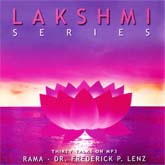
Lakshmi Series
Samadhi and The Supraconscious States
According to Brahmananda, one of the advanced students of Sri Ramakrishna, the spiritual life can be divided into two phases.
The first section or phase is separated from the second section or phase by a person's entrance into samadhi. The second phase of self-discovery begins with the entrance into samadhi.
I'd like to consider with you for a few minutes what the nature of samadhi is, examine the concept behind the samadhis, and try to gain an understanding of not only why an individual seeks to go into samadhi and how that occurs, but also what the result of this process is.
There are four basic states of awareness that a human being experiences. The first is the waking state of consciousness. The waking state of consciousness is that awareness - or that field of awareness, that aggregate of awarenesses - that you experience when you're awake and your mind is active. The waking state of consciousness includes your moods, emotions, thoughts, feelings and perceptions. From your greatest happiness to your lowest depression, from your strongest belief in yourself and in God to complete self-doubt, from lust and hatred to pure and noble self-giving, your prayer and meditation, all of the things you experience while you're awake are part of the waking state of consciousness.
The second state of consciousness is the dream state. When you go to sleep and enter into the world of dream, you walk through a doorway into another type or level of existence. This is the dream state. All of the experiences that you have in the dream state - whether you are experiencing yourself as you are in this lifetime, that is to say in the dream you conceive of yourself as the same person you are now with the same name, the same identity who's in a dream having experiences, or if you dream yourself as something else; sometimes in a dream you may find that you're another person who's having the experiences within the dream - regardless of what experience you have in the dream, whether it's a frightening dream, a happy dream, a revealing dream, a dream in which you have meditative or spiritual experiences, all of the experiences and awarenesses that you have in the dream state belong to the second primary level of consciousness.
The third level of consciousness is the deep sleep state. When you are neither awake nor in the dreaming state, you are said to be in the deep sleep state. That is to say, your body is asleep but you are not dreaming. In the deep sleep state, there is no sense of "I." The ego is not operative. The ego is the identity, the "I," the sense that, "I am, I exist, I am a certain way, I am not another way." This is the ego sense, the sense of "I." Naturally, in the waking state there's a sense of "I." It is you who are listening to this tape; it is you who are having the experiences that are occurring to you right now; it is you who reflect on the things that have occurred in your past; it is you who project or consider the future. You are the experiencer, you are the doer, you are the recipient of actions. That's the sense of "I" that you have in the waking state.
In the dreaming state, it's the same thing. You may dream yourself as yourself, or as I suggested before, you may dream yourself as another person or another being. But still, whoever is experiencing the dream has a sense of "I." I am the experiencer of the dream, I am the person or the being who is in this dream who's passing through whatever world or reality you're in in the dream state. But in the deep sleep state, there is no "I" consciousness. One merges into a third level of awareness, which is egoless.

